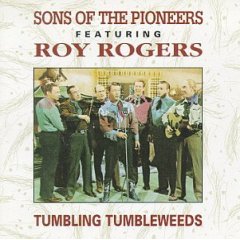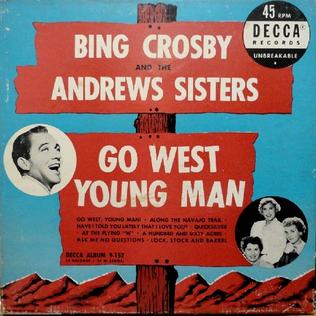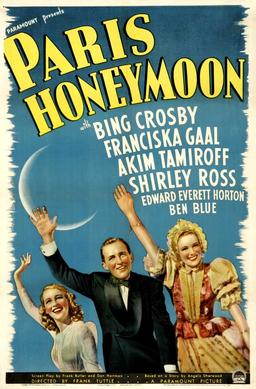
Harry Lillis "Bing" Crosby Jr. was an American singer, actor, television producer, television and radio personality and businessman. The first multimedia star, he was one of the most popular and influential musical artists of the 20th century worldwide. Crosby was a leader in record sales, network radio ratings, and motion picture grosses from 1926 to 1977. He was one of the first global cultural icons. Crosby made over 70 feature films and recorded more than 1,600 songs.
"Home on the Range" is a classic cowboy song, sometimes called the "unofficial anthem" of the American West. Dr. Brewster M. Higley of Smith County, Kansas, wrote the lyrics as the poem "My Western Home" in 1872 or 1873, with at least one source indicating it was written as early as 1871.
"Anything You Can Do (I Can Do Better)" is a show tune composed by Irving Berlin for the 1946 Broadway musical Annie Get Your Gun. The song is a duet, with one male singer and one female singer attempting to outdo each other in increasingly complex tasks.

"Back in Your Own Back Yard" is a popular song. Officially the credits show it as written by Al Jolson, Billy Rose, and Dave Dreyer; in fact, Billy Rose was exclusively a lyricist, Dreyer a composer, and Al Jolson a performer who was often given credits so he could earn some more money, so the actual apportionment of the credits would be likely to be music by Dreyer, lyrics by Rose, and possibly some small contribution by Jolson.

Dixie Lee was an American actress, dancer, and singer. She was the first wife of singer Bing Crosby.
"Deep in the Heart of Texas" is an American popular song about Texas.
"Don't Fence Me In" is a popular American song written in 1934, with music by Cole Porter and lyrics by Robert Fletcher and Cole Porter. Members of the Western Writers of America chose it as one of the Top 100 Western songs of all time.

Variety Girl is a 1947 American musical comedy film directed by George Marshall and starring Mary Hatcher, Olga San Juan, DeForest Kelley, Frank Ferguson, Glenn Tryon, Nella Walker, Torben Meyer, Jack Norton, and William Demarest. It was produced by Paramount Pictures. Numerous Paramount contract players and directors make cameos or perform songs, with particularly large amounts of screen time featuring Bing Crosby and Bob Hope. Among many others, the studio contract players include Gary Cooper, Alan Ladd, Paulette Goddard, Ray Milland, William Holden, Burt Lancaster, Robert Preston, Veronica Lake, William Bendix, Barbara Stanwyck and Paula Raymond.
Riding High is a 1950 black-and-white musical racetrack film featuring Bing Crosby and directed by Frank Capra. The songs were performed live during filming instead of the customary lip-synching to studio recordings. The film is a remake of an earlier Capra film with screenwriter Robert Riskin titled Broadway Bill (1934). While the film is generally a light musical comedy, its plot contains an unexpected tragic turn.
"(You'd Be So) Easy to Love" is a popular song written by Cole Porter for William Gaxton to sing in the 1934 Broadway show Anything Goes. However Gaxton was unhappy about its wide vocal range and it was cut from the musical. Porter re-wrote it for the 1936 film Born to Dance, where it was introduced by Eleanor Powell, James Stewart, and Frances Langford under its alternate title, "Easy to Love". The song was later added to the 1987 and 2011 revivals of Anything Goes under the complete title "You’d Be So Easy to Love".
"Along the Navajo Trail" is a country/pop song, written by Dick Charles, Larry Markes and Eddie DeLange in 1945, and first recorded by Dinah Shore in May 1945.
"Waves of the Danube" is a waltz composed by Iosif Ivanovici in 1880, and is one of the most famous Romanian tunes in the world. The song has many variations throughout the piece, reminiscent of the music of Johann Strauss. Through the Viennese style variations, there is still a distinct Slavic style. In the United States, it is frequently referred to as "The Anniversary Song", a title given by Al Jolson when he and Saul Chaplin released an adaptation of the song in 1946.
Rhythm on the Range is a 1936 American Western musical film directed by Norman Taurog and starring Bing Crosby, Frances Farmer, and Bob Burns. Based on a story by Mervin J. Houser, the film is about a cowboy who meets a beautiful young woman while returning from a rodeo in the east, and invites her to stay at his California ranch to experience his simple, honest way of life. Rhythm on the Range was Crosby's only Western film and introduced two western songs, "Empty Saddles" by Billy Hill and "I'm an Old Cowhand " by Johnny Mercer, the latter becoming a national hit song for Crosby. The film played a role in familiarizing its audience with the singing cowboy and Western music on a national level.

This is a filmography for the American singer and actor Bing Crosby.
"Go West, young man" is a quote often attributed to American author Horace Greeley concerning America's expansion westward.

"I'm an Old Cowhand (From the Rio Grande)" is a comic song written by Johnny Mercer for the Paramount Pictures release Rhythm on the Range and sung by its star, Bing Crosby. The Crosby commercial recording was made on July 17, 1936, with Jimmy Dorsey & his Orchestra for Decca Records. It was a huge hit in 1936, reaching the No. 2 spot in the charts of the day, and it greatly furthered Mercer's career. Crosby recorded the song again in 1954 for his album Bing: A Musical Autobiography.
Members of the Western Writers of America chose it as one of the Top 100 Western songs of all time. It has also been covered by numerous jazz musicians, including Sonny Rollins, Monty Alexander, Joshua Redman, and John Scofield.

"Tumbling Tumbleweeds" is a Western music song composed by Bob Nolan, a founding member of the Sons of the Pioneers. Nolan wrote the song in the early 1930s while he was working as a caddy and living in Los Angeles. It was first recorded by the Sons of the Pioneers in 1934, and it became one of the most famous songs associated with the group. Originally titled "Tumbling Leaves", the song was reworked into the title "Tumbling Tumbleweeds" and into more widespread fame with the 1935 film of the same name starring Gene Autry. Members of the Western Writers of America chose it as one of the Top 100 Western songs of all time.

Go West Young Man is a compilation album of songs on one 10" vinyl record by Bing Crosby and The Andrews Sisters released in 1950 featuring songs that were sung by Crosby and the Sisters with a Western-type genre. This album is one of the first by Crosby to not be released on 78 rpm records before going straight to an LP or set of 45s. The album includes several songs which had already enjoyed Billboard chart success. “Along the Navajo Trail” reached the No. 2 position in 1945 and "One Hundred and Sixty Acres", "Have I Told You Lately That I Love You?" and "Quicksilver" also charted.

Paris Honeymoon is a 1939 American musical film directed by Frank Tuttle and written by Frank Butler and Don Hartman. The film stars Bing Crosby, Franciska Gaal, Akim Tamiroff, Shirley Ross, Edward Everett Horton and Ben Blue. Filming took place in Hollywood from May 23 to July 1938 and the film was released on January 27, 1939, by Paramount Pictures.
This is a list of Bing Crosby songs he recorded twice or more during his career, excluding all of the 1954 re-recordings for Bing: A Musical Autobiography.








